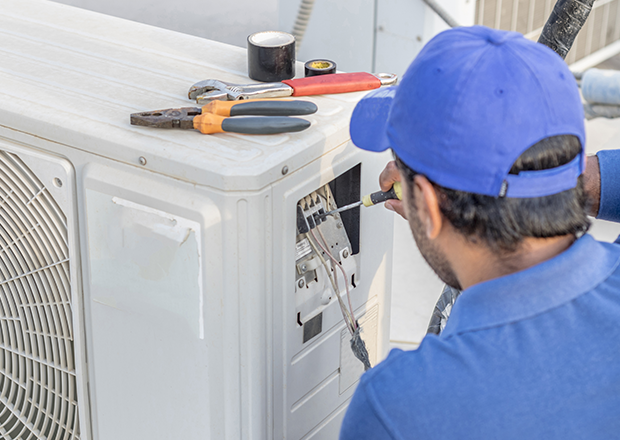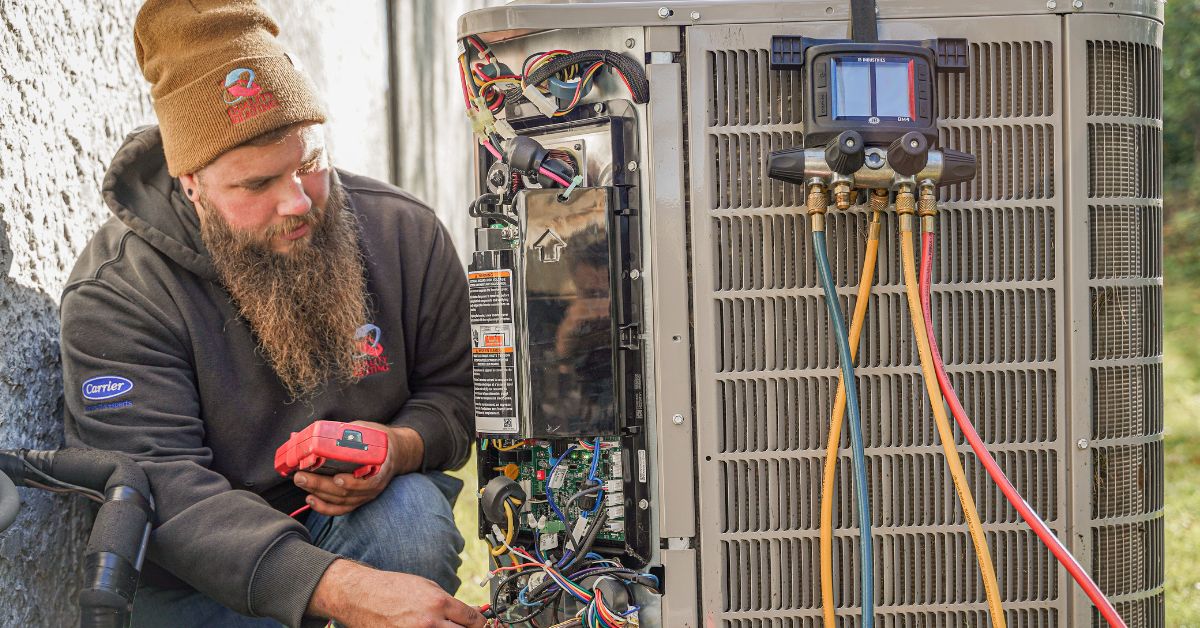Why working with an AC repairman can save you money
Wiki Article
All Concerning Heating And Cooling: Identifying Common Issues and Effective AC Fixing Approaches
A/c systems are vital for keeping interior convenience. Understanding their elements and performance is necessary for determining usual concerns. Homeowners usually encounter troubles such as ineffective cooling, odd odors, or increasing energy expenses. These indicators can indicate underlying issues that might call for interest. Exploring DIY troubleshooting methods can be useful, however understanding when to look for specialist help is just as important. What actions can be taken to assure resilient performance?Understanding Your Cooling And Heating System: Parts and Performance
A heating and cooling system, typically thought about the foundation of indoor environment control, is composed of numerous essential components that function together to regulate temperature and air quality. The primary aspects include the home heating system, air flow system, and air conditioning system. The heating system, generally a heating system or boiler, creates heat throughout colder months, while the a/c system cools indoor areas during the summertime.
Typical A/c Troubles Property Owners Experience
Home owners frequently face a number of common heating and cooling issues, including irregular temperature circulation throughout their living spaces. Additionally, uncommon sounds throughout operation can suggest underlying problems that require attention. Resolving these worries without delay is essential for keeping suitable system efficiency.Inconsistent Temperature Level Distribution
Lots of households experience the frustrating problem of inconsistent temperature circulation, where particular areas really feel uncomfortably warm while others continue to be too cool. This problem typically emerges from a variety of factors, including poor insulation, obstructed vents, or a poorly sized heating and cooling system. When air ducts are not appropriately sealed or when furniture blocks airflow, some rooms may receive inadequate cooling. Additionally, thermostat placement can significantly impact temperature law; a thermostat located in a sunlit area might misrepresent the total temperature level of your house. Normal maintenance, including cleaning filters and making sure ductwork is clear, can assist reduce these discrepancies. Home owners might also consider zoning systems to better control temperature levels throughout various locations of the home, advertising an extra comfy living atmosphere.Uncommon Noises Throughout Procedure
When a HVAC system runs, unusual noises can indicate underlying issues that require attention. Home owners may experience a series of audios, such as grinding, squealing, or hissing. Grinding sounds often signify worn-out bearings or parts, while squeaking can suggest loosened belts or parts needing lubrication. Hissing might indicate a cooling agent leakage, which can endanger the system's effectiveness. Furthermore, banging noises could point to loosened ductwork or an issue with the blower fan. Each of these sounds works as a caution, prompting property owners to examine additionally. Overlooking these indicators can cause more significant issues and pricey repair services. Regular maintenance and prompt focus to uncommon sounds can improve system durability and efficiency, ensuring a comfy living environment.Signs That Indicate Your A/c Requirements Fixing
How can one tell if their air conditioning system needs repair service? Several indications may suggest underlying problems needing expert attention. First, if the AC stops working to cool down the area properly, it might recommend a refrigerant leak or compressor malfunction. Furthermore, an increase in energy bills without matching usage adjustments could signify inadequacy in the system. House owners should additionally look out to unusual smells emanating from the system, which can suggest mold and mildew development or electric problems. If the Air conditioning frequently cycles on and off, it could be an indicator of a malfunctioning thermostat or other mechanical problems. Lastly, the existence of water merging around the unit can show a stopped up drain line. Recognizing these indicators early can conserve time and cash, making certain that the cooling system runs efficiently and properly.DIY Troubleshooting Techniques for Cooling And Heating Issues
When facing cooling and heating issues, homeowners can use a number of DIY fixing strategies to identify the trouble. Key techniques consist of checking thermostat setups, inspecting air filters, and examining water drainage issues. These steps can assist determine common malfunctions prior to looking for expert assistance.Checking Thermostat Setups
What steps should homeowners take to ensure their thermostat setups are proper? They must verify the thermostat is set to the desired temperature level and setting, whether home heating or air conditioning. Examining for a clear display screen and validating the thermostat is not set to "hold" or "vacation" setting is necessary. House owners must likewise verify that the thermostat is level and mounted in an area devoid of drafts, straight sunlight, or other temperature level affects. Furthermore, rectifying the thermostat can aid provide precise analyses. If the thermostat operates batteries, changing them might resolve any issues. By systematically examining these variables, house owners can typically determine and fix thermostat-related troubles, promoting ideal a/c system efficiency.Inspecting Air Filters
Air filters play a necessary function in keeping suitable heating and cooling efficiency. They trap dirt, allergens, and various other bits, ensuring clean air blood circulation. Over time, filters can come to be blocked, lowering air flow and effectiveness. To evaluate here air filters, individuals must first find the filter, typically found in the return air duct or near the heater. Once situated, they should review the filter's condition-- if it shows up dirty or tarnished, it most likely requirements replacement. Most filters call for altering every 1-3 months, depending upon usage and environmental factors. Routine evaluation and timely replacement of air filters not just enhance air quality yet likewise extend the lifespan of HVAC systems, preventing possible malfunctions and costly repair services.
Assessing Drainage Issues
Exactly how can home owners effectively identify and attend to water drainage issues within their heating and cooling systems? Initially, they should check the condensate drain line for obstructions or blockages, which can result in water buildup. House owners might make use of a wet/dry vacuum cleaner to clear any type of debris obstructing the line. Next, examining the drainpipe frying pan for corrosion or leakages is necessary, as a harmed frying pan can trigger water to overflow. Normal cleansing of the drain line with a mix of vinegar and water helps avoid future blockages. Furthermore, making sure appropriate slope of the drain line promotes effective water circulation. If these do it yourself strategies do not resolve the issue, getting in touch with a professional HVAC technician may be essential to stay clear of possible water damages and system failing.When to Call an Expert for Air Conditioner Repairs

While some a/c concerns can be managed with do it yourself techniques, there are situations where calling an expert becomes crucial. House owners must seek skilled assistance when they run into consistent troubles, such as inadequate air conditioning, strange sounds, or unusual smells emanating from the system. These symptoms might indicate deeper issues that require specialized knowledge and devices to identify and repair correctly.

Preventative Upkeep Tips for Heating And Cooling Long Life
Routine preventative upkeep can significantly boost the durability of HVAC systems. House owners ought to set up annual assessments by certified professionals to evaluate system performance and identify prospective issues. Routinely transforming or cleaning up air filters is essential, as this guarantees correct airflow and decreases strain on the system. In addition, checking and sealing ductwork stops power loss and improves general efficiency.
It is also a good idea to maintain the outdoor unit clear of particles and plant life, enabling peak air flow and warm exchange. Home owners should inspect the condensate drain for obstructions to stay clear of water damages and mold growth. Additionally, keeping appropriate thermostat settings and using programmable choices can boost power performance. Documenting maintenance tasks aids track solution history and can help in determining repeating issues. By following these preventative measures, people can make the most of the efficiency and lifespan of their HVAC systems
Frequently Asked Inquiries
Just how Often Should I Change My HVAC System Filters?
Heating and cooling system filters click here ought to usually be replaced each to 3 months, relying on use, filter type, and ecological variables. Normal substitute aids keep effectiveness and air quality, guaranteeing peak system efficiency throughout the year.What Size Heating And Cooling System Do I Required for My Home?
To identify the appropriate cooling and heating system size for a home, one must take into consideration square footage, insulation top quality, and regional environment. Consulting an expert can help assure maximum efficiency and convenience for the particular living space.Are There Eco-Friendly HVAC Options Available?
Yes, green cooling and heating options are available, consisting of energy-efficient heatpump, solar-powered systems, and geothermal heating. These choices reduce power consumption and ecological impact, advertising sustainability while maintaining efficient climate control for property and business spaces.Just How Can I Improve My cooling and heating System's Energy Effectiveness?
To boost HVAC energy effectiveness, one can routinely preserve the system, seal air leakages, mount programmable thermostats, use energy-efficient filters, and assurance appropriate insulation throughout the home to lower energy consumption and improve efficiency.
What Is the Ordinary Life-span of a Cooling And Heating System?
The typical click here life expectancy of a heating and cooling system generally ranges from 15 to 25 years, relying on aspects such as maintenance, use, and the high quality of setup. Regular maintenance can significantly expand its operational longevity.Final thought
In summary, a complete understanding of HVAC systems equips property owners to recognize usual problems and address small problems properly. Identifying indications of breakdown, employing do it yourself repairing strategies, and focusing on regular maintenance can improve system efficiency and performance. Nevertheless, when encountered with intricate repairs, enlisting expert assistance is vital to assure safety and security and long life. By promoting recognition and aggressive treatment, people can enjoy a comfortable indoor atmosphere while decreasing unanticipated expenses associated with HVAC failures.Report this wiki page